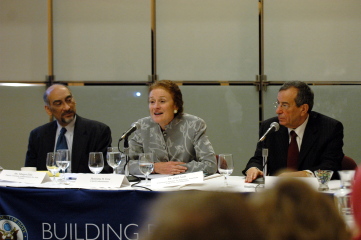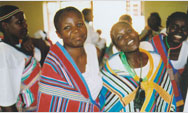| |
Building Partnerships:
Development in Diverse Muslim Societies

On January 7, 2009, the U.S. Agency for International Development (USAID) convened a panel session titled "Building Partnerships: Development in Diverse Muslim Societies".
Practitioners from the development community highlighted creative and effective approaches to programming in societies with a significant Muslim population, with the goal of strengthening relationships, fostering partnerships, and sharing best practices.
Agenda (160K  ) )
Participant Biographies (164K  ) )
Goals
Highlights
Panelists and Speakers
GOALS
- Recognize existing NGO efforts in community-based, sustainable, and relevant development in Muslim majority countries.
- Highlight and encourage public-private partnerships as effective approaches to development.
- Draw attention to the challenges and continuing opportunities in Muslim majority countries.
- Create opportunities for follow up through virtual networking, capacity building resources, and related ongoing dialogue on these issues.
HIGHLIGHTS
PARTNERSHIPS WITH RELIGIOUS ACTORS
Issues:
- Religious leaders often feel they have been excluded or are discriminated against. There can be distrust on both sides at first, but there needs to be a spirit of true respect and partnership.
- There is built-in resistance between units such as Islam and the West, but it is fragmented and penetrable. People must find universal values
Best Practices:
- Sustain connections with religious institutions, actors, and leaders to promote respectful dialogue that honors their dignity, proactive involvement, and responsibility for community wellbeing through relevant development.
- Utilize local traditions and language to interpret development goals and priorities instead of imposing concepts or irrelevant vocabulary.
- Do not do something and hide it. Make sure the recipient sees it.
- People need to realize that the greatest strength is each other.
 |
|
Manal Omar (USIP) delivers remarks at the session
(Photo: USAID) |
PARTNERSHIPS WITH CORPORATIONS
Issues:
- Corporations want to know "What's in it for me?"
Best Practices:
- Enhance and further educate corporations on the role they play in effective development practices.
- As multinationals gain greater access to communities through manufacturing, retail, and industry, they must move beyond one-dimensional corporate social responsibility efforts toward engaging with community-centered development where partnerships are leveraged.
- Some examples of why corporations might be interested in partnerships include:
- enhancing the reputation of the corporation in a community;
- enhancing the employee experience; and
- providing an opportunity to engage with consumers and understand them.
 |
Center: Iqbal Noor Ali (Aga Khan Foundation USA) delivers the session's keynote address (Photo: USAID) |
PARTNERSHIPS WITH GOVERNMENTS
Issues:
- When we don't find local partners, we don't build legitimacy.
Best Practices:
- Engage governments to promote in-country public-private partnerships.
- Help build capacity of ministries to engage better with key stakeholders to address concerns from community-based organizations.
- Be aware and responsive to the conversations between governments and their local communities about development priorities and directions.
|
 |
|
From left to right: Iqbal Noor Ali (Aga Khan Foundation USA), Henrietta H. Fore (USAID), and Ziad Asali (American Task Force on Palestine)
(Photo: USAID) |
PANELISTS AND SPEAKERS
The following panelists and speakers participated in the event:
• Henrietta H. Fore, Administrator, USAID;
• James K. Glassman, Undersecretary of State for Public Diplomacy;
• Sada Cumber, State Department's Special Envoy to the Organization of the Islamic Conference;
• Iqbal Noor Ali, Chief Executive Officer of the Aga Khan Foundation USA;
• Azi Hussain, International Center for Religion and Diplomacy;
• Kip Knight, Knight Vision Marketing;
• Douglas Ramage, The World Bank;
• Dr. Ziad Asali, American Task Force on Palestine;
• Manal Omar, U.S. Institute of Peace; and
• Jack Boyson, International Youth Foundation.
Future Meetings
Information to follow
Back to Top ^
|


